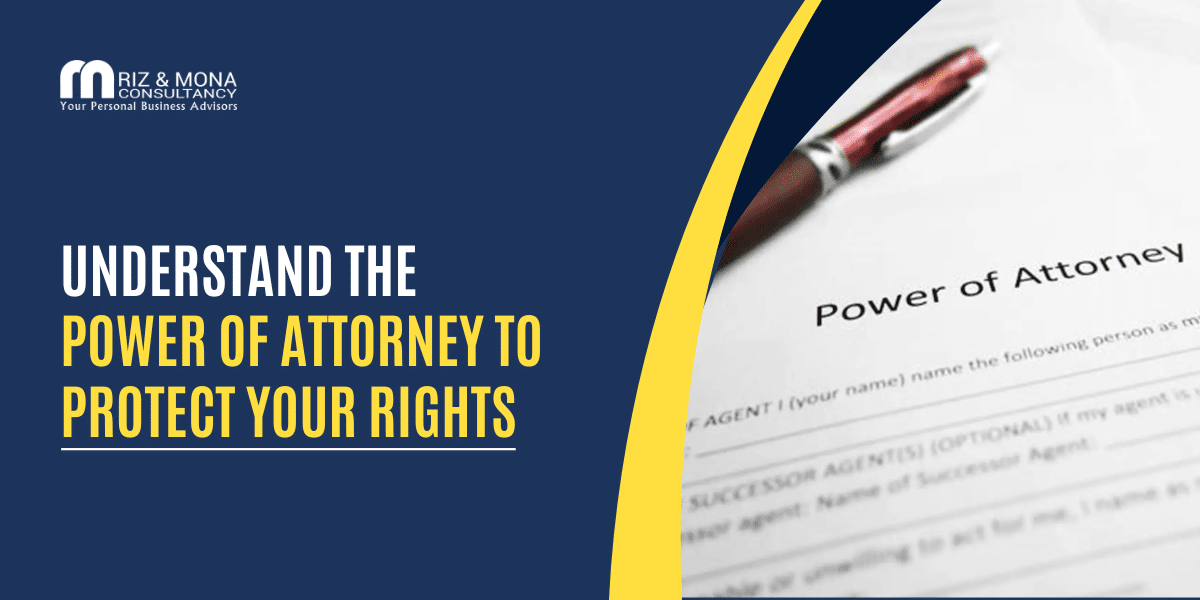A Power of Attorney is a legal document that allows someone to act on your behalf in managing important decisions. Whether you need someone to handle financial matters, make health care decisions, or represent you in legal matters, a POA grants a trusted agent the authority to act as you would.
This is especially crucial if you become mentally incapacitated or are unavailable to make decisions yourself. By creating a POA, you ensure that your affairs will be managed according to your wishes, even if you can’t make those decisions directly.
Why You Might Need a Power of Attorney
A POA is more than just a formality, it’s a critical tool for managing your affairs when you can’t be present. Having a POA provides flexibility, security, and peace of mind, ensuring that your legal, financial, and healthcare needs are handled according to your preferences. Below are some common situations where having a POA is essential:
Types of Power of Attorney (POA)
General Power of Attorney (GPOA)
A General Power of Attorney grants an attorney-in-fact the authority to manage a variety of your affairs, including financial, legal, and administrative matters. It allows your agent to act in your place in situations where you might be unavailable or unable to manage these aspects of your life. This type of POA is often used for a temporary absence or for situations where the principal is incapacitated.
-
When to Use: When you need someone to act on your behalf in multiple areas like managing your finances, signing contracts, or handling various legal matters.
-
Key Advantage: Allows your agent to make a wide range of decisions without restrictions.
Special Power of Attorney (SPA)
A Special Power of Attorney is more specific. It grants your agent authority to handle a single, clearly defined task or a set of tasks, such as selling property, managing a specific real estate transaction, or collecting a cheque.
-
When to Use: For one-time transactions or specific actions, such as signing a contract for a property sale or handling a business-related matter.
-
Key Advantage: Provides clear, limited authority for specific tasks, ensuring your agent only handles what’s required.
Durable Power of Attorney (DPOA)
A Durable POA or Enduring Power of Attorney remains in effect even if the principal becomes incapacitated. It’s designed to continue operating after the principal loses mental competence, making it a crucial tool for estate planning.
-
When to Use: For long-term planning, especially when you want to ensure someone can manage your affairs if you become mentally or physically incapacitated.
-
Key Advantage: Stays in effect even if the principal becomes incapacitated, ensuring continuous management of your affairs.
Springing Power of Attorney
A Springing Power of Attorney only takes effect when a specific event occurs, such as the incapacitation of the principal. This type of POA “springs” into action when the principal becomes unable to make decisions, ensuring that the agent can act when needed.
-
When to Use: When you want the POA to remain dormant until you become incapacitated or otherwise unable to make decisions.
-
Key Advantage: Provides control over when the POA takes effect, offering peace of mind that it will only be used when necessary.
Medical Power of Attorney (Health Care Proxy)
A Medical Power of Attorney, or Health Care Proxy, or Health Care Power of Attorney allows you to appoint someone to make medical decisions on your behalf if you become unable to do so. This is especially important if you’re incapacitated or in a situation where you can’t communicate your healthcare preferences.
-
When to Use: When you want to ensure your medical care is managed according to your wishes, even if you can’t make decisions yourself.
-
Key Advantage: Guarantees that someone you trust will handle your healthcare decisions when you are unable to do so.
Financial Power of Attorney
A Financial Power of Attorney grants the agent the authority to handle financial decisions on behalf of the principal, such as managing bank accounts, paying bills, or making investments.
-
When to Use: If you need someone to manage your financial matters, either temporarily or for the long term.
-
Key Advantage: Ensures your financial decisions are managed according to your wishes, especially if you’re unable to do so.
Ordinary Power of Attorney (OPA)
An Ordinary Power of Attorney grants someone the authority to act on your behalf for general or specific tasks, such as managing finances or handling real estate transactions. However, it is temporary and becomes invalid if the principal becomes incapacitated.
-
When to Use: For situations where you need someone to manage tasks for a limited time, such as signing documents, handling property sales, or managing financial decisions.
-
Key Advantage: It provides limited authority for specific tasks but terminates if the principal becomes incapacitated.
Start Your Business Journey with Our Professional Support!
How to Create a Power of Attorney (POA)
The first step is to decide what type of POA you need. Whether it’s a general power of attorney, a medical POA, a property POA, or a special power of attorney, each type grants different levels of authority to your agent. Choose the one that best suits your needs. To get started, you will need to find and fill out the appropriate Power of Attorney form for the type you require.
Select someone you trust to act on your behalf. This could be a family member, a friend, or a professional, depending on the decisions that need to be made. It’s important to appoint someone who understands your wishes and can make decisions in your best interest. You can appoint more than one agent and specify whether they will act jointly (together) or separately (independently). You may also choose alternate agents to step in if the primary agent is unavailable.
The Power of Attorney document should clearly state the specific powers granted to the agent. This could include managing financial matters, making healthcare decisions, or handling legal matters. Be as specific as possible to avoid confusion about the authority to act.
You can set a time frame for the POA’s effectiveness. For example, a springing power of attorney might only activate in certain situations, like if you become incapacitated. You can also specify whether the POA is valid indefinitely or for a limited period.
In most cases, a POA document needs to be notarized to be legally valid. This ensures that the agent has the authority to act on your behalf. Notarization verifies that the document was signed by you, the principal, willingly and without duress.
Once the POA is created and notarized, make sure to store it in a safe place. You should also give a copy to your agent, so they have access to it when needed. Additionally, consider informing close family members or other relevant individuals about the POA.
If you ever need to revoke the Power of Attorney (for example, if you no longer want the agent to act on your behalf), you can terminate the POA by creating a revocation document and notifying the agent. The revocation should also be notarized.
Risks of Mistakes and Potential Self-Dealing in a Power of Attorney (POA)
When creating a Power of Attorney (POA), it’s important to understand how it works and how it differs from a Health Care Proxy.If the POA gives broad powers, your agent could misuse that authority for personal benefit.This is called self-dealing, and it can happen if the document isn’t written clearly.Make sure you define the powers properly and only give authority you fully trust.
1. Difficulty Correcting Mistakes
If the POA document is not clear or has errors, correcting those mistakes can be challenging and time-consuming. For example, if you mistakenly grant broad authority in areas that should have been limited, it might be difficult to retract those powers once the POA is active. It’s essential to be very clear and precise when outlining the powers you are granting.
2. Danger of Self-Dealing
Self-dealing occurs when an agent takes advantage of their position for their own benefit rather than acting in the best interest of the principal. This is particularly concerning when the POA grants the agent access to significant financial powers, such as managing bank accounts or selling property. Without proper safeguards, agents could potentially use this authority for personal gain, such as transferring funds into their own accounts or selling assets for their benefit.
3. Authority Over Financial Accounts and Gifts
An agent with a POA may have access to your bank accounts, the power to make gifts, and the ability to transfer your funds. While this can be useful in some situations, it also presents a risk. The agent may misuse this power, for example, by transferring money to themselves or making gifts to others without your consent.
4. Selling Property
One of the most serious risks is that an agent may have the authority to sell your property. If the POA grants broad authority, this could mean the agent has the ability to sell real estate, liquidate assets, or make major financial decisions without any checks or balances. This is why it is crucial to specifically outline the powers you wish to grant and to limit them where necessary.
5. Safeguarding Against Abuse
To protect against the risks of self-dealing and mistakes, it’s essential to:
-
Limit the powers granted to your agent: Be specific about what decisions they can make and in what areas.
-
Monitor the actions of your agent: If possible, keep an eye on major transactions, especially in areas like finances or property sales.
-
Choose a trustworthy agent: Ensure the person you select has a clear understanding of your wishes and is trustworthy enough to act in your best interest.
-
Consult a legal professional: A legal expert can help ensure that your POA document is clear, specific, and legally valid, reducing the risk of any potential issues or abuse.
Note: If you still have questions about how a Power of Attorney works or what requirements apply in the UAE, take a look at our Power of Attorney common questions for more detailed answers.
Steps to Modify a Power of Attorney
If your circumstances have changed and you wish to adjust the powers granted to your agent without starting a new, modifying your existing POA is a practical solution
Steps to Revoke a Power of Attorney
Create a formal document titled “Revocation of Power of Attorney,” stating your intent to cancel the existing POA. Include your full legal name, the agent’s name, and the date of the original POA.
Sign the revocation document in front of a notary public to ensure its legal validity.
Provide written notice to the agent, informing them that their authority has been revoked. It’s advisable to deliver this notice via certified mail or in person to confirm receipt.
Notify institutions that relied on the original POA, such as banks, healthcare providers, or government agencies. Provide them with a copy of the revocation document to update their records.
Retrieve and destroy all copies of the original POA to prevent any future misuse.
If the original POA was recorded with a government office (e.g., county clerk), file the revocation document with the same office to update the public record.
International Considerations for POAs
When creating a Power of Attorney (POA), it’s important to consider its validity if you move abroad or need it recognized in another country. POAs created in one country may not automatically be valid in another due to differences in legal systems. To ensure international recognition, you may need to attest the document with the appropriate embassy or consulate and possibly get it translated into the local language.
In cases of cross-border POAs, it’s essential to check local regulations, as some countries require specific language, notarization, or additional documents for a POA to be enforceable. If you’re planning to move abroad, seek advice from a legal professional to ensure your POA remains effective and valid in the new country.
FAQS (Frequently Asked Questions)
Can a Power of Attorney be used to make decisions for a minor child?
Yes, a Power of Attorney can grant an agent the authority to make decisions for a minor child, such as consenting to medical treatment or enrolling the child in school. This is often used when parents are temporarily unavailable.
Can a Power of Attorney be used to access digital assets?
Yes, a Power of Attorney can include provisions that grant an agent access to digital assets, such as online accounts and digital files. It’s important to specify these powers to ensure the agent can manage digital affairs effectively.
Can a Power of Attorney be used to make gifts or change beneficiary designations?
Yes, but only if the Power of Attorney explicitly grants such authority. Without this provision, the agent cannot make gifts or alter beneficiary designations. It’s crucial to specify these powers to prevent potential misuse.
Can a Power of Attorney be used after the principal's death?
No, a Power of Attorney becomes invalid upon the death of the principal. After death, the executor named in the will or a court-appointed administrator manages the estate. For instance, a woman holding POA for her late brother couldn’t access his U.S. bank account to donate funds to charity, as the POA ceased upon his death .














